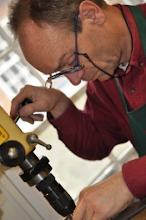Her arthritis is too serious to wind her Victorian black slate clock herself. She asks the cleaning lady to do so. The beautifully crafted Winterhalder and Hofmeier chiming and striking clock in the corridor leaves her cold. I must have been called back at least three times after I repaired her Victorian black slate clock (see picture below) because it had stopped. How is that possible? I gave it my everything. I cleaned it according to the high West Dean College conservation standards. Only white spirit as cleaning fluid, pegged out all the pivot holes, checked all the wheels and pinions meticulously, checked the endshake, the depthing of each of the three trains, wheel pair by wheel pair, rebushed where needed and paid great attention to detail, repairing and improving a few minor things along the way. After the repair, I had it on test for two weeks in my workshop. And it all ran fine.
 |
| black slate clock |
Yet, the call of an 80-year old for help with
clearly something that is so dear to her that she does not want to know about
the beauty of her Winterhalder and Hofmeier, moves me enough to get up from my
bench onto my bike, down the hill to her care home. Am I doing this, because my
parents are equally old and dependent on others, while I am too far away to do
this for them? Is this a guilt trip?
I know she has someone to wind her clock
now. Luckily, she lives around the corner, so travelling to her place is easily
combined with running an errand in the village. I have been there several times
now to discover that only the striking train had been wound!
Learning
point: Clearly, I
have not paid enough attention to explaining the very basics of setting time,
winding a clock, the difference between the left and right (and sometimes
middle) winding holes, how to start a pendulum swinging again. In my written
reports, I explain some of these things, but who reads them? A one-to-one
client clock debriefing really needs to become part of my routine. Sitting down
with the client when I bring the clock back after a repair to talk them
leisurely through all the things that are important to keep the clock running.
Besides, these short meetings, sometimes hit on the very things life is all
about. In talking my 90-year retired actor clients through my conservation
report of their grandfather clock (which he, by accident, had knocked over when
rushing to the phone—during an acting lull—in the hope there was another gig on
offer) we ended up singing "My Grandfather Clock" together around the
coffee table:
My grandfather's clock
Was too large for the shelf,
So it stood ninety years on the floor;
It was taller by half
Than the old man himself,
Though it weighed not a pennyweight more.
It was bought on the morn
Of the day that he was born,
And was always his treasure and pride;
But it stopped short
Never to go again,
When the old man died.
I am blessed to be a clockmaker.

No comments:
Post a Comment